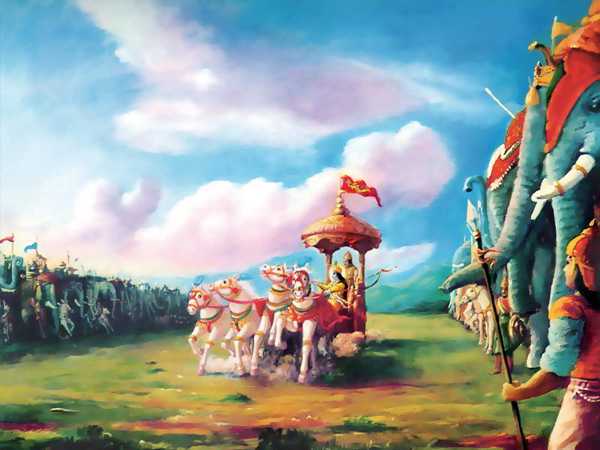Chapter 26

“Yudhishthira said, ‘What words from me, O Sanjaya, hast thou heard,indicative of war, that thou apprehendest war? O sire, peace ispreferable to war. Who, O charioteer, having got the other alternativewould wish to fight? It is known to me, O Sanjaya, that if a man can haveevery wish of his heart without having to do anything, he would hardlylike to do anything even though it might be of the least troublesomekind, far less would he engage in war. Why should a man ever go to war?Who is so cursed by the gods that he would select war? The sons ofPritha, no doubt, desire their own happiness but their conduct is evermarked by righteousness and conducive to the good of the world. Theydesire only that happiness which results from righteousness. He thatfondly followeth the lead of his senses, and is desirous of obtaininghappiness and avoiding misery, betaketh himself to action which in itsessence is nothing but misery. He that hankers after pleasure causeth hisbody to suffer; one free from such hankering knoweth not what misery is.As an enkindled fire, if more fuel be put upon it, blazeth forth againwith augmented force, so desire is never satiated with the acquisition ofits object but gaineth force like unkindled fire when clarified butter ispoured upon it. Compare all this abundant fund of enjoyment which kingDhritarashtra hath with what we possess. He that is unfortunate neverwinneth victories. He that is unfortunate enjoyeth not the voice ofmusic. He that is unfortunate doth not enjoy garlands and scents! nor canone that is unfortunate enjoy cool and fragrant unguents! and finally hethat is unfortunate weareth not fine clothes. If this were not so, wewould never have been driven from the Kurus. Although, however, all thisis true, yet none cherished torments of the heart. The king being himselfin trouble seeketh protection in the might of others. This is not wise.Let him, however, receive from others the same behaviour that he displaystowards them. The man who casteth a burning fire at midday in the seasonof spring in a forest of dense underwood, hath certainly, when that fireblazeth forth by aid of the wind, to grieve for his lot if he wisheth toescape. O Sanjaya, why doth king Dhritarashtra now bewail, although hehath all this prosperity? It is because he had followed at first thecounsels of his wicked son of vicious soul, addicted to crooked ways andconfirmed in folly. Duryodhana disregarded the words of Vidura, the bestof his well-wishers, as if the latter were hostile to him. KingDhritarashtra, desirous solely of satisfying his sons, would knowinglyenter upon an unrighteous course. Indeed, on account of his fondness forhis son, he would not pay heed to Vidura, who, out of all the Kurus, isthe wisest and best of all his well-wishers, possessing vast learning,clever in speech, and righteous in act. King Dhritarashtra is desirous ofsatisfying his son, who, while himself seeking honours from others, isenvious and wrathful, who transgresses the rules for the acquisition ofvirtue and wealth, whose tongue is foul, who always follows the dictatesof his wrath, whose soul is absorbed in sensual pleasures, and who, fullof unfriendly feelings to many, obeys no law, and whose life is evil,heart implacable, and understanding vicious. For such a son as this, kingDhritarashtra knowingly abandoned virtue and pleasure. Even then, OSanjaya, when I was engaged in that game of dice I thought that thedestruction of the Kurus was at hand, for when speaking those wise andexcellent words Vidura obtained no praise from Dhritarashtra. Then, Ocharioteer, did trouble overtake the Kurus when they disregarded thewords of Vidura. So long as they had placed themselves under the lead ofhis wisdom, their kingdom was in a flourishing state. Hear from me, Ocharioteer, who are the counsellors now of the covetous Duryodhana. Theyare Dussasana, and Sakuni the son of Suvala, and Karna the Suta’s son! Oson of Gavalgana, look at this folly of his! So I do not see, though Ithink about it, how there can be prosperity for the Kurus and theSrinjayas when Dhritarashtra hath taken the throne from others, and thefar seeing Vidura hath been banished elsewhere. Dhritarashtra with hissons is now looking for an extensive and undisputed sovereignty over thewhole world. Absolute peace is, therefore, unattainable. He regardethwhat he hath already got to be his own. When Arjuna taketh up his weaponin fight, Karna believeth him capable of being withstood. Formerly theretook place many great battles. Why could not Karna then be of any availto them. It is known to Karna and Drona and the grandsire Bhishma, asalso to many other Kurus, that there is no wielder of the bow, comparableto Arjuna. It is known to all the assembled rulers of the earth, how thesovereignty was obtained by Duryodhana although that repressor of foes,Arjuna, was alive. Pertinanciously doth Dhritarashtra’s son believe thatit is possible to rob the sons of Pandu of what is their own, although heknoweth having himself gone to the place of fight, how Arjuna comfortedhimself when he had nothing but a bow four cubits long for his weapon ofbattle. Dhritarashtra’s sons are alive simply because they have not asyet heard that twang of the stretch Gandiva. Duryodhana believeth hisobject already gained, as long as he beholdeth not the wrathful Bhima. Osire, even Indra would forbear to rob us of our sovereignty as long asBhima and Arjuna and the heroic Nakula and the patient Sahadeva arealive! O charioteer, the old king with his son still entertains thenotion that his sons will not be perished, O Sanjaya, on the field ofbattle, consumed by the fiery wrath of Pandu’s sons. Thou knowest, OSanjaya, what misery we have suffered! For my respect to thee, I wouldforgive them all. Thou knowest what transpired between ourselves andthose sons of Kuru. Thou knowest how we comforted ourselves towardsDhritarashtra’s son. Let the same state of things still continue, I shallseek peace, as thou counsellest me to do. Let me have Indraprastha for mykingdom, Let this be given to me by Duryodhana, the chief of Bharata’srace.'”




